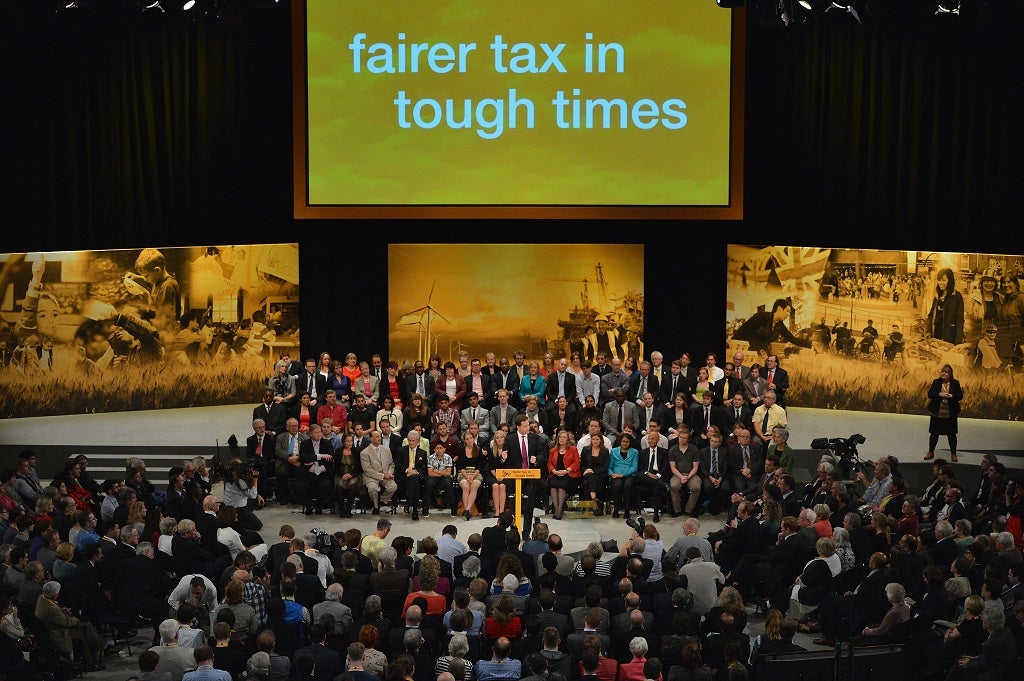For all the claims made about wealth taxes, it's not correct to say the rich are paying their fair share
To make arguments about the fairness, or otherwise, of the UK tax system purely on the basis of the burden of income tax is absurd. These pundits should know better


Your support helps us to tell the story
From reproductive rights to climate change to Big Tech, The Independent is on the ground when the story is developing. Whether it's investigating the financials of Elon Musk's pro-Trump PAC or producing our latest documentary, 'The A Word', which shines a light on the American women fighting for reproductive rights, we know how important it is to parse out the facts from the messaging.
At such a critical moment in US history, we need reporters on the ground. Your donation allows us to keep sending journalists to speak to both sides of the story.
The Independent is trusted by Americans across the entire political spectrum. And unlike many other quality news outlets, we choose not to lock Americans out of our reporting and analysis with paywalls. We believe quality journalism should be available to everyone, paid for by those who can afford it.
Your support makes all the difference.The Liberal Democrats’ call for a “mansion tax” (that is, a higher rate of council tax for the most expensive properties), possibly supplemented by some form of wealth tax seems to have provoked a peculiarly illogical misuse of one particular statistic among economic commentators who really should know better.
Their objective appears to be to show that the “rich” are already paying more than their “fair share”, and that any additional imposition would be both unfair and economically damaging. This is, of course, an entirely legitimate argument, both as a matter of ideology and of economics. But they will have to come up with some rather more convincing facts and evidence than they have so far.
First, Dominic Lawson here in The Independent argued:
“The top 1 per cent of income earners paid 24.8 per cent of all income tax collected: the same group’s earnings were 11.2 per cent of the total.”
Meanwhile, in the Telegraph, Allister Heath pointed out:
“The top 1pc, who earn £156,000 or above, will pay a whopping 24.2pc of all income tax this year, a much higher contribution than their 10.8pc share of all income. The top 10pc of earners – those on at least £50,500 – will pay 55.3pc of all income tax, also far more than their income share.”
On twitter, Fraser Nelson observed:
“Britain’s best paid 1pc contribute 24pc of all income tax collected. You’ll never hear a Lib Dem quote that statistic… the top 1pc earn something like 17pc of the wealth, so their share of tax is far higher. No politician quotes these figures.”
Remarkably consistent; and accurate, so far as it goes (see here). So, it sounds like top earners are paying a lot, both in absolute terms and as a proportion of their income. But what does this tell us about ability to pay, “fairness”, or the feasibility or desirability of a wealth tax? Almost nothing. To make arguments about the fairness, or otherwise, of the UK tax system purely on the basis of the burden of income tax is simply absurd. Income tax is the largest single tax; but it constitutes only about 27 per cent of the overall tax take. VAT and National Insurance Contributions (NICs), combined, account for considerably more, and bear much less heavily on high earners (let alone the asset-wealthy).
In Romney's class
It makes no more sense to look at income tax on its own than to look at either of these two taxes on their own – which would lead you to completely different conclusions. Essentially, all three are making precisely the same error as Mitt Romney, who recently observed that “47 percent of Americans pay no income tax”; ignoring the fact that many of these are retired, and most of those who are not pay the payroll tax, while all, of course, pay tax in one form or another.
So what can we say about the overall “fairness” of the UK tax system? The definitive source here is the ONS annual report on the effects of taxes and benefits on household income. Looking at Table 14, we can see that the top 10 per cent have gross income averaging £107,500, of which they pay £35,000 - just under a third – in all taxes, direct and indirect. Meanwhile, the average household has income of £37,700, of which they pay £12,700, or just over a third, in taxes. There are lots of other tables and other ways of presenting the information (Table 9 has a simplified version of the same table, by income quintiles for non-retired households, which again shows the top 20 per cent paying very slightly less than the average as a proportion of their income).
Overall, it is impossible to avoid the conclusion that for the vast majority of the population the UK tax system is at most modestly progressive. Indeed, the raw figures might suggest it was slightly regressive, although for the reasons set out here that would be stretching the data. In any case, the direct implication in the quotes above that top earners are paying much more than their “share” is just wrong. (It should be noted that none of these figures tell us anything about the super-rich – the top 0.1 per cent. It seems likely to me that, given that much of their income will be in the form of capital gains or otherwise not subject to income tax, their effective tax rate may be lower than the one third which seems to apply to most of the income distribution, but this is speculation.)
Now both Mr Heath and Mr Nelson (see note at end) have said to me that they were merely pointing out that by any measure income tax bears heavily on those who earn most. And this narrow point is correct (although no serious analyst of the tax system would look at income tax in this way, separate from the much less progressive NICs, levied mostly on the same income). It is quite reasonable to argue, on the basis of the above statistics, that a very large proportion of the income tax take comes from high earners, and there are limits to how much more could be realised from that particular source. But that’s not what they are trying to argue. Instead, both are attempting to use this highly partial – at best – statistic as an argument against the Liberal Democrats’ policies for the increased taxation of wealth and property, which, as far as I can tell, would be implemented either via the council tax – currently highly regressive, since it represents a much larger fraction of the value of the average property than of a “mansion – or through an entirely new wealth tax.
Taxes are not the end of the story either. The benefit system is highly progressive, so, overall, the system is indeed redistributive, especially for the bottom two quintiles; their share of total income doubles as a consequence. But much less so at the top. The share of original income that goes to the top tenth of the population is about a third: their share of final income, after all taxes and benefits, is only slightly less, at about 29 per cent. Hardly confiscatory.
Misleading
None of this stops Lawson going all in on the Romney hypothesis that the tax and benefit system is just a device to transfer wealth from those who earn it to the half of the population, or more, that supposedly pays no taxes and is dependent on state benefits:
“The effective tax rate in the US is not negative just for those in the bottom two quintiles (ie, the bottom 40 per cent); even the middle quintile were net recipients. Or, as Mankiw expressed it: ‘The middle class, having long been a net contributor to the funding of government, is now a net recipient of government largesse.’..Inspired by this observation, Britain’s own Centre for Policy Studies has attempted a similar analysis of the fiscal position in the UK. It has shown me its provisional figures, which reveal a very similar situation. It is clearly a complex business to work out the value of all benefits at every income level, so the numbers need to be treated with caution, especially because many in the lower-earning brackets will be retired people. None the less, the figures are striking. According to the CPS, in the year 2010/2011 taxes less transfers as a proportion of original income were minus 211 per cent for the lowest quintile, minus 85 per cent for the second lowest quintile and minus 23 per cent for the middle quintile. It is only when you get into the top 40 per cent that people begin to be net contributors.”
The clue here is, of course, that “many in the lower earning brackets will be retired people”. The figures Lawson attributes to the CPS also come from the ONS report; and the ONS presents them in a much more useful form, broken down between the retired and the non-retired. If you look at non-retired, only the bottom quintile (most of whom have no-one in work) are not net contributors. So the middle class is a “net recipient of government largesse” only in the sense that they pay into the system when they are working and take out of it when they are retired. If Lawson understands this, then the paragraph above is deliberately misleading; if he doesn’t, he really shouldn’t be writing about these issues.
It is clearly possible on the basis of the facts to argue that the UK tax and benefit system is progressive; that top earners are paying their “share”; and (a separate argument) that there are significant potential disadvantages to wealth and property taxes (although I am sceptical that there is any serious economic or fairness argument at all against making council tax less regressive than it is at present). But to argue any of these on the basis simply of the share of income tax paid by top earners is at best disingenuous, particularly when the numbers giving the broader picture are so easily available. Frankly, this fixation on one largely irrelevant statistic suggests that those who do so are rather short of intellectually credible or well-evidenced arguments.
[To be fair, Fraser Nelson's Telegraph column, subsequent to our twitter exchange, focuses much more directly on wealth taxes, although it is also remarkably short of actual evidence. "Do you tax only British wealth? Then people will move their investments abroad" does not seem to me to be a persuasive argument against higher taxes on expensive residential property.].
Join our commenting forum
Join thought-provoking conversations, follow other Independent readers and see their replies
Comments